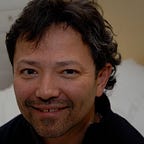Deleuze and History 3
Perspectives on Deleuze: History as Opening
History as Becoming
History does not progress in accordance with a transcendent principle or a structure that stands outside of history.
We create history inside of history. We are the interior of history.
There is no prescription for history, no call to revolution, but the return of difference only; the return of deterritorialization.
History is the folding, unfolding and refolding of difference. History moves in ruptures and a randomness that overflows order.
Underneath all movement in history there is only chaos.
History as Contingent
The social and political necessities of the present, that we are born into, are by no means artificial or irrelevant. They are no less real and bloody than they would be under any other theory of history. But:
our experience of the now = duration + the eternal return.
History is contingent and the world we live in is vital, alive, dynamic, changeable. The illusion of being bound to history serves only to separate us from our natural power and ability to go to the limit and create and experiment inside of history.
History is open ended, a becoming in which pure difference is affirmed, and overcoded flows are decoded temporally; and stratifications and striations clogging up the return of the new are deterritorialized.
The philosophy of history is a living philosophy of becoming.
Karl Popper and Fallibility
History as the pure process of the new ties in with previous discussions on practical thought and science. There, I mentioned fallibility as a cornerstone of the explanatory power of theory.
Karl Popper wrote extensively on social and political thought, as well as the philosophy of science. Popper’s view was that any social science must also seek out fallible theories. Certainty is no more available in social science than it is in natural science, and a single viewpoint is never justified.
In The Open Society and Its Enemies, Popper distinguished between open and closed societies.
Closed societies are those that conform around a single structure, authority and tradition; a single view that is unchallengeable.
Open societies, on the other hand, subject their own structure and authority, values and beliefs, to scrutiny; openness to analysis and questioning fosters social and political progress.
Open societies are often liberal democracies, an unfinished outcome; closed societies often authoritarian and totalitarian.
But Popper was an historical indeterminist: history does not evolve in accordance with intrinsic laws or principles, and prediction in the social sciences is an impossibility.
Any theory of social science, including history, must be subjected to critical scrutiny and falsifiability.
Conversely, theories of history that point to a determinist vision of history are authoritarian and, if not challenged, are capable of undermining the open society.
Hegel and Totalitarianism
We might pause and ask ourselves what philosophy of history might have influenced the rise of the totalitarian regimes witnessed in the 20th century?
Hegel’s idealism, the dialectic of history, leads to his unchallengeable endorsement of the organic state.
At the end of history, the individual dissolves into the unity of the absolute state.
It is easy to find in Hegel’s philosophy of history the totalitarian state-worship that marked the rise of Hitler and Nazism. And Hegel’s history of philosophy, reinterpreted by Marx as “historical materialism,” did not lead to a classless society in which the state falls away, but instead to the ruthless totalitarianism of Stalin and Mao.
Hegel’s dialectic as the engine and goal of history, his onto-theology, applied to the organic state or to class economics, becomes a tool for the legitimization of the power to dominate, and nothing more.
The End of History?
Notwithstanding the terrors that resulted as a consequence of closed 20th century political ideologies, determinist visions of history, such as Francis Fukuyama’s The End of History and the Last Man, still make their way into the canon of historical thought.
But such theories are inevitably proven wrong by the continuing and overwhelming change that returns to society and politics, the return of difference-in-itself.
History is an opening up of the new, an opening up that not always leads to desirable outcomes.
But history understood as a dynamic process that we participate in opens up the possibility for creativity and experimentation with the new.
History as opening opens up the possibility for the creation of social and political formations that affirm life, that would not otherwise be conceivable.
I hope you enjoyed this article. Thanks for reading!
Tomas
Please join my email list here or email me at tomas@tomasbyrne.com.
Excerpt from my forthcoming book, Becoming: A Life of Pure Difference (Gilles Deleuze and the Philosophy of the New) Copyright © 2021 by Tomas Byrne. Learn more here.
